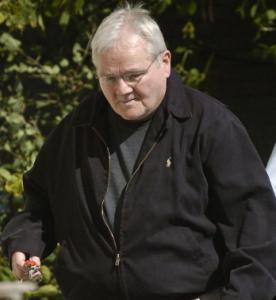 |
| Donald McGuire |
A priest who resigned
from the Boston College board of trustees following criticism of his
supervision of Donald McGuire — a former Jesuit priest and teacher at
Loyola Academy in Wilmette who was convicted of child sexual abuse — has
also resigned from the boards of three other Jesuit-affiliated
institutions. Officials at Loyola
University of Chicago, Georgetown University and Brebeuf Jesuit, a
preparatory school in Indianapolis, say the Rev. Bradley Schaeffer has
cut his ties with their schools. Schaeffer allowed McGuire to continue ministry
despite complaints about McGuire’s behavior with boys in the early
1990s, when Schaeffer led the Chicago Jesuit Province. He has expressed
“deep regret” for failing to stop McGuire,
Link (here) to The Chicago Sun Times










3 comments:
While Donald McGuire was the most notorious of the priests that Bradley Schaeffer failed to discipline, we now know there were several others as well.
It is an outrage that Brad Schaeffer held so many leadership positions, including the President of the Jesuit Conference from 1998 to June 2006. He was also head of the Faber Jesuit Community at Boston College, where many young Jesuits were in training.
Yet nothing was done until the Boston Globe published its stories this month. I guess losing becomes a bad habit after awhile....
MISERENTISSIMUS REDEMPTOR
ENCYCLICAL OF POPE PIUS XI
ON REPARATION TO THE SACRED Given at Rome, at St. Peter's, on the eighth day of May, 1928
"...When Christ manifested Himself to Margaret Mary, and declared to her the infinitude of His love, at the same time, in the manner of a mourner, He complained that so many and such great injuries were done to Him by ungrateful men - and we would that these words in which He made this complaint were fixed in the minds of the faithful, and were never blotted out by oblivion: "Behold this Heart" - He said - "which has loved men so much and has loaded them with all benefits, and for this boundless love has had no return but neglect, and contumely, and this often from those who were bound by a debt and duty of a more special love." In order that these faults might be washed away, He then recommended several things to be done, and in particular the following as most pleasing to Himself, namely that men should approach the Altar with this purpose of expiating sin, making what is called a Communion of Reparation, - and that they should likewise make expiatory supplications and prayers, prolonged for a whole hour, - which is rightly called the "Holy Hour." These pious exercises have been approved by the Church and have also been enriched with copious indulgences.
13. But how can these rites of expiation bring solace now, when Christ is already reigning in the beatitude of Heaven? To this we may answer in some words of St. Augustine which are very apposite here, - "Give me one who loves, and he will understand what I say" (In Johannis evangelium, tract. XXVI, 4).
For any one who has great love of God, if he will look back through the tract of past time may dwell in meditation on Christ, and see Him laboring for man, sorrowing, suffering the greatest hardships, "for us men and for our salvation," well-nigh worn out with sadness, with anguish, nay "bruised for our sins" (Isaias liii, 5), and healing us by His bruises. And the minds of the pious meditate on all these things the more truly, because the sins of men and their crimes committed in every age were the cause why Christ was delivered up to death, and now also they would of themselves bring death to Christ, joined with the same griefs and sorrows, since each several sin in its own way is held to renew the passion of Our Lord: "Crucifying again to themselves the Son of God, and making him a mockery" (Hebrews vi, 6). Now if, because of our sins also which were as yet in the future, but were foreseen, the soul of Christ became sorrowful unto death, it cannot be doubted that then, too, already He derived somewhat of solace from our reparation, which was likewise foreseen, when "there appeared to Him an angel from heaven" (Luke xxii, 43), in order that His Heart, oppressed with weariness and anguish, might find consolation. And so even now, in a wondrous yet true manner, we can and ought to console that Most Sacred Heart which is continually wounded by the sins of thankless men, since - as we also read in the sacred liturgy - Christ Himself, by the mouth of the Psalmist complains that He is forsaken by His friends: "My Heart hath expected reproach and misery, and I looked for one that would grieve together with me, but there was none: and for one that would comfort me, and I found none" (Psalm lxviii, 21).
"I pray that you and many other Jesuits will be called to the prison ministry as I was."
-Donald McGuire in a letter to Ed Schmidt SJ, Chicago Provincial, June 12, 2007
Post a Comment